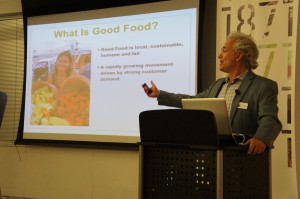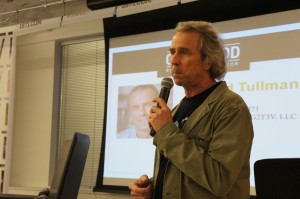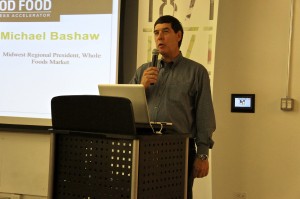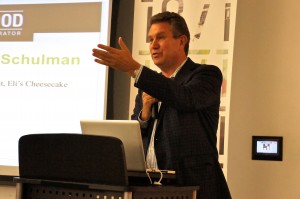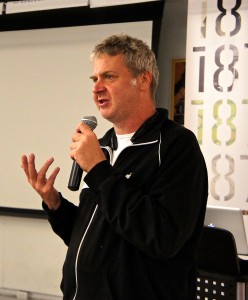by Bob Benenson, FamilyFarmed
The launch of FamilyFarmed’s Good Food Business Accelerator program on Oct. 1 drew a standing-room crowd to the spacious auditorium at 1871, the start-up incubator that is Chicago’s center of innovation. The turnout was symbolic of the rapid growth of the Good Food movement — and of its community of entrepreneurs, investors, large-scale buyers, consumers, and activists.
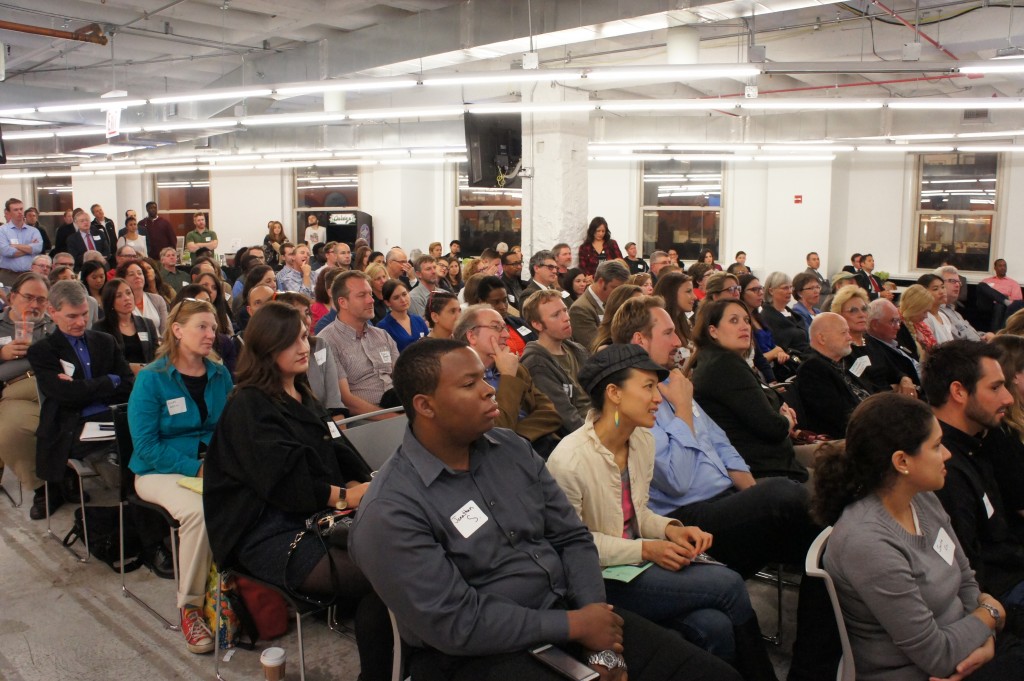
FamilyFarmed’s Good Food Business Accelerator event on Oct. 1 drew an SRO crowd to the auditorium at 1871, the Chicago business incubator that will host the Accelerator program.
The Accelerator program will be located at 1871 in the historic Merchandise Mart. It will provide its eight selected Fellows with six months of intensive mentorship from industry leaders and technical support on how to shape their businesses and financial plans, and networking opportunities with potential buyers, customers and investors.
Applications for acceptance into the program can be submitted through Oct. 20. Businesses invited to apply are those involved with Good Food, meaning that which is local, sustainable, humane, and fair. They must be located in and supply the Chicago food shed with products and services that will expand the supply of Good Food.
The range of business that will be considered for fellowships is very broad: food artisans, farmers, food technology companies, craft beverage makers, food processors, restaurants, foodservice firms, and consumer packaged goods companies. “If you’re a food business that’s an innovator and will at some level help build a more sustainable supply chain, we invite you to take a look at what we’re doing and consider applying,” said Jim Slama, president and founder of FamilyFarmed, a non-profit that for more than 15 years has worked to grow the Good Food movement.
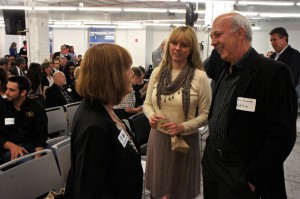
FamilyFarmed Board Chairwoman Charlotte Flinn and Director Mari Gallagher chat with Irv Cernauskas of Irv and Shelly’s Fresh Picks prior to the Accelerator event.
Slama noted that Fellows can pitch at the Good Food Financing and Innovation Conference on March 19. Businesses participating at the conference in recent years have done $8 million in deals. But, Slama said, “Most of the businesses pitching were not weren’t fully developed. Either they didn’t have a very good business plan, or they weren’t thoughtful about where they were going to sell the product, or they didn’t have a deal that investors or banks would respond to.”
This, he said, prompted the decision to create the Good Food Business Accelerator. “Our goal,” Slama said, “is to work with entrepreneurs to get them ready for prime time.”
The Good Food Business Accelerator was welcomed by 1871 CEO Howard Tullman, who has a long history with FamilyFarmed. Widely known as a “serial entrepreneur,” he was president of Chicago’s Kendall College, a school focused on culinary arts, when it hosted FamilyFarmed’s first Good Food Trade Show in 2005. The event was the first sustainable local food trade show in America and is the basis for many of FamilyFarmed’s impactful programs that grow the supply chain of Good Food.
Tullman said the Midwestern entrepreneurial energy being generated by 1871 and tenants such as the Good Food Business Accelerator is attracting the attention of those accustomed to viewing the East and West coasts as the centers for economic innovation. “People are starting to get the idea of the Rise of the Rest, that there’s something going on between the coasts, and where it’s going on most is in Chicago,” Tullman said. 1871 currently has over 280 businesses in residence.
Others speaking at the event included FamilyFarmed Board Chairman Charlotte Flinn; Michael Bashaw, Midwest region president for Whole Foods Market, which is a lead partner in the Good Food Business Accelerator; and Marc Schulman, president of the Chicago-based Eli’s Cheesecake company, who is co-chairing FamilyFarmed’s 2015 Good Food Financing and Innovation Conference.
The event also featured a panel, moderated by Slama, of successful entrepreneurs: John Hall, the founder and longtime head of the Goose Island craft brewing company, who was a lead investor in FarmedHere, an innovative vertical farming operation in suburban Bedford Park; Irv Cernauskas, who with his wife Shelly Herman runs the Good Food home delivery service Irv and Shelley’s Fresh Picks in suburban Niles; and Gene Mealhow, the Iowa farmer behind the fast-growing Tiny But Mighty heirloom popcorn company.
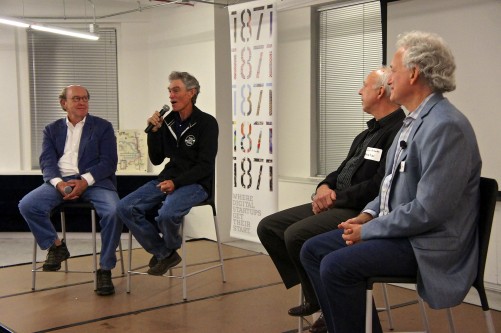
The entrepreneur panel discussion at the Good Food Business Accelerator event featured (left to right): John Hall, founder and longtime CEO of the Goose Island craft brewing company; Gene Mealhow, farmer and co-owner of the Tiny But Mighty heirloom popcorn company; Irv Cernauskas, who with his wife runs Irv and Shelly’s Fresh Picks, a Good Food home delivery service; and FamilyFarmed President Jim Slama.
The Accelerator event capped a big day for Mealhow, whose farm and popcorn were featured that day in a long article on the front page of the New York Times food section. The crowd gave him a standing ovation when the article was recognized and Slama commented, “Farmer Gene has risen above many years of adversity to truly command the label of ‘rock star farmer.’”
Of course, the night wouldn’t be complete without good food and drink. Food was provided by e.a.t. spots, a Chicago social enterprise serving Good Food at downtown kiosks that formerly were newsstands — a project developed in partnership with Irv and Shelly’s Fresh Picks and StreetWise, a non-profit that provides employment training and other social services to people who are homeless or at-risk of becoming homeless. Ken Waagner — the founder of e.a.t., which stands for Education + Agriculture + Technology — also spoke during the panel discussion.
Beverages were provided by Virtue, which produces artisan hard cider in Michigan; Forbidden Root, a Chicago craft brewery that uses unique botanicals in many of its recipes; Koval, which in 2008 blazed a craft spirits trail by becoming Chicago’s first licensed distillery since Prohibition; Karma Kombucha; and Belli’s Local Foods Market & Juice Bar.
The event also highlighted the depth of partnerships associated with the Accelerator. Whole Foods Market, the nation’s largest natural foods supermarket chain, and UNFI, the nation’s leading distributor of natural and organic food, are strategic partners. Lead funding for the GFBA came from Food:Land:Opportunity — Localizing the Chicago Foodshed, an initiative of the Searle Funds at The Chicago Community Trust that seeks to strengthen the resiliency of the region by increasing the supply of local and sustainable food.
The Accelerator has also earned two federal grants: $50,000 from the U.S. Small Business Administration Growth Accelerator Fund Competition and $99,673 from the USDA’s Local Food Promotion Program.
Photos by Bob Benenson

